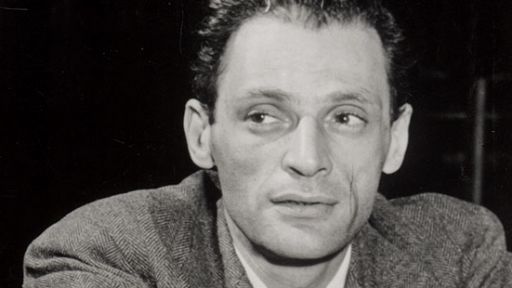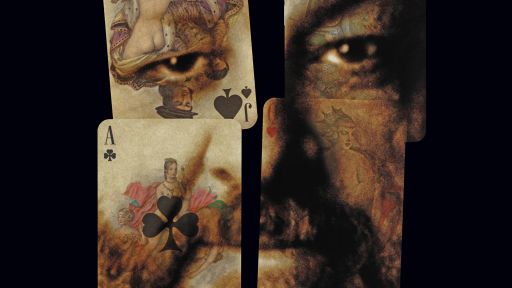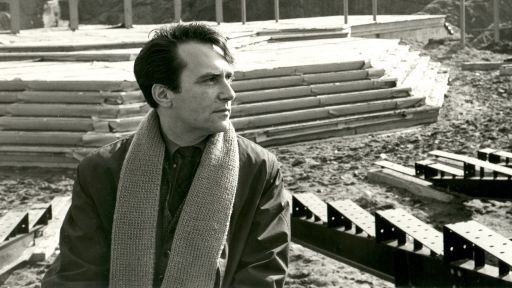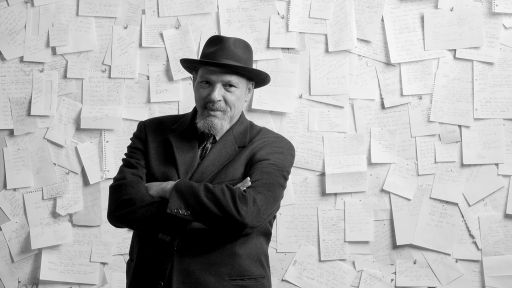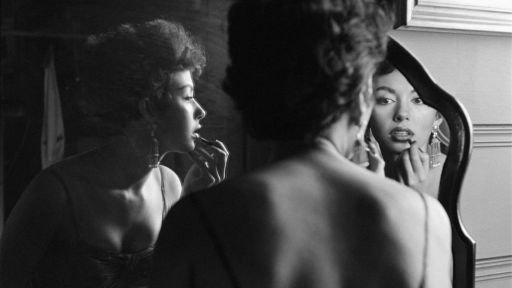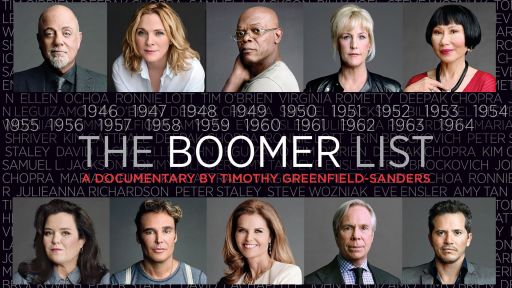Arthur Miller was called before the House Un-American Activities Committee in 1956, as HUAC’s power was waning. He was cited for contempt of Congress for refusing to identify people who he had met at two communist writers’ meetings. This portion of his testimony is near the end of the proceedings.
Richard Arens (counsel for HUAC and a former aide to Senator McCarthy): Do you know a person by the name of Sue Warren?
Arthur Miller: I couldn’t recall at this moment.
Mr. Arens: Do you know or have you known a person by the name of Arnaud D’Usseau?
Mr. Miller: I have met him.
Mr. Arens: What has been the nature of your activity in connection with Arnaud D’Usseau?
Mr. Miller: Just what is the point?
Mr. Arens: Have you been in any Communist Party sessions with Arnaud D’Usseau?
Mr. Miller: I was present at meetings of Communist Party writers in 1947, about 5 or 6 meetings.
Mr. Arens: Where were those meetings held?
Mr. Miller: They were held in someone’s apartment. I don’t know whose it was.
Mr. Arens: Were those closed party meetings?
Mr. Miller: I wouldn’t be able to tell you that.
Mr. Arens: Was anyone there who, to your knowledge, was not a Communist?
Mr. Miller: I wouldn’t know that.
Mr. Arens: Have you ever made application for membership in the Communist Party?
Mr. Miller: In 1939 I believe it was or in 1940 I went to attend a Marxist study course in the vacant store open to the street in my neighborhood in Brooklyn. I there signed some form or another.
Mr. Arens: That was an application for membership in the Communist Party, was it not?
Mr. Miller: I would not say that. I am here to tell you what I know.
Mr. Arens: Tell us what you know.
Mr. Miller: This is now 16 years ago. That is half a lifetime away. I don’t recall and I haven’t been able to recall and, if I could, I would tell you the exact nature of that application. I understood then that this was to be, as I have said, a study course. I was there for about 3 to 4 times perhaps. It was of no interest to me and I didn’t return.
Mr. Arens: Who invited you to attend?
Mr. Miller: I wouldn’t remember. It was a long time ago.
Mr. Arens: Tell us, if you please, sir, about these meetings with the Communist Party writers which you said you attended in New York City.
Mr. Miller: I was by then a well-known writer. I have written All my Sons, and a novel Focus, and a book of Reportage about Ernie Pyle and my work with him on attempting to make the picture The Story of GI Joe. I did research for that, so that by the time I was quite well known, and I attended these meetings in order to locate my ideas in relation to Marxism because I had been assailed for years by all kinds of interpretations of what communism was, what Marxism was, and I went there to discover where I stood finally and completely, and I listened and said very little, I think, the 4 or 5 times.
Mr. Arens: Could I just interject this question so that we have it in the proper chronology? What occasioned your presence? Who invited you there?
Mr. Miller: I couldn’t tell you. I don’t know.
Mr. Arens: Can you tell us who was there when you walked into the room?
Mr. Miller: Mr. Chairman, I understand the philosophy behind this question and I want you to understand mine. When I say this I want you to understand that I am not protecting the Communists or the Communist Party. I am trying to and I will protect my sense of myself. I could not use the name of another person and bring trouble on him. These were writers, poets, as far as I could see, and the life of a writer, despite what it sometimes seems, is pretty tough. I wouldn’t make it any tougher for anybody. I ask you not to ask me that question. (Miller confers with his lawyer) I will tell you anything about myself, as I have.
Mr. Arens: These were Communist Party meetings; were they not?
Mr. Miller: I will be perfectly frank with you in anything relating to my activities. I take the responsibility for everything I have ever done, but I cannot take responsibility for another human being.
Mr. Arens: This record shows, does it not, Mr. Miller, that these were Communist Party meetings? (Miller confers with his lawyer) Is that correct?
Mr. Miller: I understood them to be Communist writers who were meeting regularly.
Mr. Arens: Mr. Chairman, I respectfully suggest that the witness be ordered and directed to answer the question as to who it was that he saw at these meetings.
Donald Jackson (HUAC member and former House Representative from California): May I say that moral scruples, however laudable, do not constitute legal reason for refusing to answer the question. I certainly endorse the request for direction.
Francis Eugene Walter (Chairman of HUAC from 1955-1963 and former House Representative from Pennsylvania): You are directed to answer the question, Mr. Miller.
Mr. Miller: May I confer with my attorney for a moment? (Miller confers with his lawyer) Mr. Walter, could I ask you to postpone this question until the testimony is completed and you can gage for yourself?
Mr. Walter: Of course, you can do that, but I understand this is about the end of the hearing.
Mr. Arens: This is about the end of the hearing. We have only a few more questions. The record reflects that this witness has identified these meetings as the meetings of the Communist writers. In the jurisdiction of this committee he has been requested to tell this committee who were in attendance at these meetings.
Arthur Miller explains his position on Communist thought and the relationship of art to politics
Mr. Walter: Mr. Miller, what has this to do –
Mr. Miller: I am trying to elucidate my position on the relation of art.
Mr. Arens: Was Arnaud D’Usseau chairman?
Gordon Scherer (HUAC member and former House Representative from Ohio): Just a minute. Mr. Chairman, may I interrupt?
Mr. Walter: Yes.
Mr. Scherer: There is a question before the witness; namely, to give the names of those individuals who were present at the Communist Party meeting of Communist writers. There is a direction on the part of the chairman to answer the question. Now so that the record may be clear, I think we should say to the witness – Witness, would you listen?
Mr. Miller: Yes.
Mr. Scherer: We do not accept the reasons you gave for refusing to answer the question and that it is the opinion of the committee that, if you do not answer the question, that you areplacing yourself in contempt. That is an admonition that this committee must give you in compliance with the decisions of the Supreme Court. Now, Mr. Chairman, I ask that you again direct the witness to answer the question.
Mr. Walter: He has been directed to answer the question and he gave us the answer that we just do not accept.
Mr. Arens: Was Arnaud D’Usseau chairman of this meeting of Communist Party writers which took place in 1947 at which you were in attendance?
Mr. Miller: All I can say, sir, is that my conscience will not permit me to use the name of another person (Miller confers with his lawyer). And that my counsel advises me that there is no relevance between this question and the question of whether I should have a passport or there should be passport legislation in 1956.
Mr. Arens: Mr. Chairman, I respectfully suggest that the witness be ordered and directed to answer the question as to whether or not Arnaud D’Usseau – A-r-n-a-u-d. The last name is D-‘-U-s-s-e-a-u – was chairman of the meeting of the Communist Party writers in New York City in 1947 at which you were in attendance.
Mr. Walter: You are directed to answer the question.
Mr. Miller: I have given you my answer, sir.
Mr. Arens: I ask you now, sir, whether or not Sue Warren was in attendance at this meeting of the Communist Party writers held in New York City in 1947?
Mr. Miller: I have given you my answer.
Harold Velde (HUAC member and former House Representative from Illinois): Do you know Sue Warren?
Mr. Jackson: Did you decline to answer the question?
Mr. Miller: (Miller confers with his lawyer) I tell you, sir, that I have given my answer.
Mr. Jackson: I am not satisfied with that. That is entirely too vague. What I want is a positive statement as to whether or not you will answer that question.
Mr. Miller: (Miller confers with his lawyer) Sir, I believe I have given you the answer that I must give.
The hearing concluded shortly after this, with Miller continuing to refuse to name any names.

